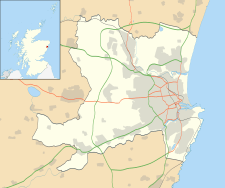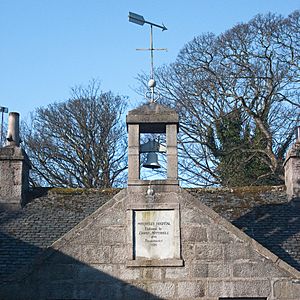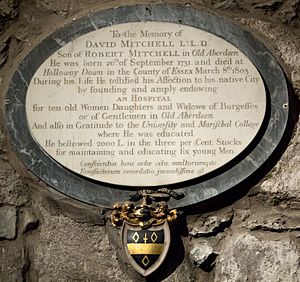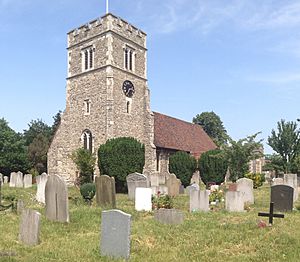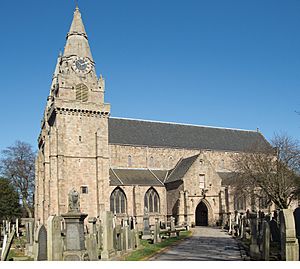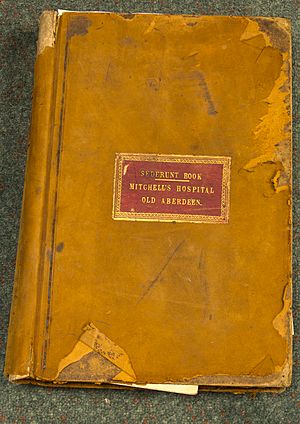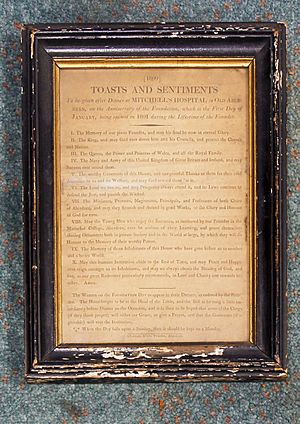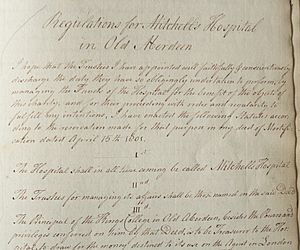Mitchell's Hospital Old Aberdeen facts for kids
Quick facts for kids Mitchell's Hospital Old Aberdeen |
|
|---|---|
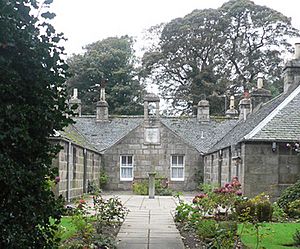
Mitchell's Hospital 2012
|
|
| Geography | |
| Location | Aberdeen, Scotland, United Kingdom |
| Coordinates | 57°10′08″N 2°06′13″W / 57.168819°N 2.1035680°W |
| Organisation | |
| Care system | Public NHS |
| Hospital type | General |
| History | |
| Founded | 1801 |
| Closed | 1924 (converted to flats) |
Mitchell's Hospital, Old Aberdeen is a special building in Old Aberdeen, Scotland. It was started in 1801 by a kind person named David Mitchell. He wanted to help the people of Old Aberdeen. He especially wanted to provide a home, food, and clothes for older widows and unmarried daughters of important local gentlemen, merchants, or tradesmen.
The Hospital is now looked after by the University of Aberdeen, Aberdeen City Council, and the Cathedral Church of St Machar. It began because local groups wanted to create a "care home" for their older and unwell members and their widows.
From 1801 until the early 1900s, the hospital was a safe place for widows from Old Aberdeen. David Mitchell set very clear rules for who could live there. One rule was that people named "Mitchell" were preferred. At first, the residents lived together, following strict rules for their care. A special Board of Management made sure Mitchell's wishes were followed.
The hospital has been changed twice in the 1900s. It now has self-contained flats for elderly ladies. However, the original rules set by David Mitchell still guide how it works today, even with modern money limits.
Contents
History of Mitchell's Hospital
Who Was David Mitchell?
David Mitchell came from a big family in Old Aberdeen. He was born around September 24, 1731. His father was Robert Mitchell, and his mother was Christian Forbes. David went to Marischal College in Aberdeen from 1748 and finished his studies in 1752. He was the only one in his family to go to college.
We don't know much about David for almost 50 years after college. It seems he lived in Holloway Down, Essex, which is now part of London. He owned a farm there. David was probably a stockbroker, someone who buys and sells shares for others. He also had interests in insurance and shipping. He even owned at least three ships that worked for the East India Company.
David was very generous. In 1801, he gave money to Marischal College to help six students. Because of his gifts to the Hospital and the College, he was made an important citizen of Old Aberdeen and "new" Aberdeen. He also received an honorary degree from Marischal College in 1801.
David didn't leave a will when he died in 1803. But we know he lived a comfortable life. He even got a family coat of arms, though it wasn't originally his family's. He seemed to adopt it later in life, perhaps when thinking about his legacy.
Starting the Hospital: The "Auld Maids Hospital"
Around November 1800, the head of King's College in Old Aberdeen heard that "an unknown gentleman" wanted to start a hospital. This hospital would care for ten old women from the city. This idea was very popular!
The College quickly contacted local groups like the Merchant Society and the Trades Council. Everyone agreed to help. The town council of Old Aberdeen even offered land for the hospital for free. Soon, the idea of a hospital for older women became a reality.
David Mitchell officially gave £5500 (a large sum of money back then) for the hospital on May 25, 1801. The hospital was to be called "Mitchell's Hospital" forever. David wrote a very detailed document called a "Mortification." This document explained exactly how the hospital should be run. It covered who could live there, what they should wear, and even what food they should eat!
The rules said the ladies had to be good and honest. It also said that people named "Mitchell" or "Forbes" (David's mother's name) should be chosen first. The residents had to wear "gowns of a deep blue colour." Because of this, they were often called "auld maids in blue gowns."
The rules were very strict. For example, two women were turned away even though they were poor and good people. This was because they couldn't prove their husbands were linked to the local trades. One woman who was accepted, Mary Weir, was so unwell that she had to be brought to the hospital in a cart. This shows how much help these women needed.
David Mitchell continued to be very interested in the hospital from his home in London. He asked about the residents, the building, and its insurance. After he died in 1803, his family continued to help. His nephew, Alexander Mitchell, gave a large hand bell and a clock. These helped the residents know when it was mealtime or when the doors closed at night. His sister Mary insisted on a long wooden bench for the ladies to sit on in Old Machar Church on Sundays. An unnamed brother gave a large marble table for the dining room.
The family's generosity continued. Marble plaques were put up in the hospital and the church to remember David's kindness. The hospital also received special horn cups with silver rims. These were used by the residents, managers, and visitors at an annual Founder's Day celebration every December 31st.
Mitchell's Hospital in the 20th Century
The building was updated in 1924 and again in 1965. These changes turned the hospital into self-contained flats for elderly ladies.
 | Valerie Thomas |
 | Frederick McKinley Jones |
 | George Edward Alcorn Jr. |
 | Thomas Mensah |


